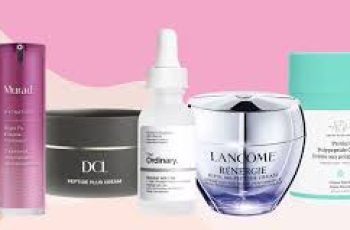
Humectants in Skin Care Products
What is a humectant?
Humectants are hygroscopic ingredients, meaning they are able to attract and retain water molecules from their surrounding environment.
Humectants are commonly found in moisturizers and other hydrating skincare products. However, there are a few caveats about when to use and when to avoid using humectants in your skincare routine.
Find out more about how humectants work, examples of humectant ingredients, and when to use them here.
To find out if humectant moisturizers are right for you- take the skin type quiz.
What is a humectant moisturizer?
Humectant moisturizers grab water and bind it to the skin’s surface.
They can temporarily plump fine lines and wrinkles and give skin a dewy glow.
Here are examples of humectant moisturizers:
Filorga NCEF-ESSENCE Supreme Multi-Correction Lotion
$68.00
Out of Stock
Filorga NCEF-REVERSE Supreme Multi-Correction Cream
$114.00
Out of Stock
Murad Targeted Wrinkle Corrector
$78.00
Add to Cart
Neocutis BIO GEL FIRM Moisturizing Hydrogel
$83.00
Add to Cart
ClarityRx Get Balanced Probiotic Serum
$78.00
Add to Cart
EltaMD PM Restore Moisturizer
$17.00
Add to Cart
Emepelle Night Cream
$195.00
Add to Cart
Filorga GLOBAL-REPAIR INTENSIVE Nutri-Restorative Multi-Revitalising Serum
$124.00
Out of Stock
Filorga HYDRA-HYAL Intensive Hydrating Plumping Concentrate
$69.00
Out of Stock
Filorga MESO-MASK Smoothing Radiance Mask
$69.00
Out of Stock
Filorga NCEF-ESSENCE Supreme Multi-Correction Lotion
$68.00
Out of Stock
Filorga NCEF-REVERSE Supreme Multi-Correction Cream
$114.00
Out of Stock
Murad Targeted Wrinkle Corrector
$78.00
Add to Cart
Neocutis BIO GEL FIRM Moisturizing Hydrogel
$83.00
Add to Cart
ClarityRx Get Balanced Probiotic Serum
$78.00
Add to Cart
EltaMD PM Restore Moisturizer
$17.00
Add to Cart
Emepelle Night Cream
$195.00
Add to Cart
Filorga GLOBAL-REPAIR INTENSIVE Nutri-Restorative Multi-Revitalising Serum
$124.00
Out of Stock
Filorga HYDRA-HYAL Intensive Hydrating Plumping Concentrate
$69.00
Out of Stock
Filorga MESO-MASK Smoothing Radiance Mask
$69.00
Out of Stock
Filorga NCEF-ESSENCE Supreme Multi-Correction Lotion
$68.00
Out of Stock
Filorga NCEF-REVERSE Supreme Multi-Correction Cream
$114.00
Out of Stock
Murad Targeted Wrinkle Corrector
$78.00
Add to Cart
Neocutis BIO GEL FIRM Moisturizing Hydrogel
$83.00
Add to Cart
ClarityRx Get Balanced Probiotic Serum
$78.00
Add to Cart
EltaMD PM Restore Moisturizer
$17.00
Add to Cart
Emepelle Night Cream
$195.00
Add to Cart
Filorga GLOBAL-REPAIR INTENSIVE Nutri-Restorative Multi-Revitalising Serum
$124.00
Out of Stock
Filorga HYDRA-HYAL Intensive Hydrating Plumping Concentrate
$69.00
Out of Stock
Filorga MESO-MASK Smoothing Radiance Mask
$69.00
Out of Stock
Hyaluronic acid serums are the best humectant moisturizers.
ISDIN Hyaluronic Booster 10 Ampoules
$46.00
Add to Cart
ISDIN Hyaluronic Concentrate
$100.00
Add to Cart
ISDIN Instant Flash
$40.00
Add to Cart
La Roche-Posay Hyalu B5 Hyaluronic Acid Serum
$39.99
Add to Cart
CeraVe Hydrating Hyaluronic Acid Serum
$20.99
Out of Stock
ClarityRx Daily Dose of Water Hyaluronic Acid Hydrating Serum
$80.00
Add to Cart
ClarityRx Get Balanced Probiotic Serum
$78.00
Add to Cart
ClarityRx Take It Easy Calming Serum
$76.00
Add to Cart
Filorga HYDRA-HYAL Intensive Hydrating Plumping Concentrate
$69.00
Out of Stock
ISDIN Flavo-C Ultraglican Ampules
$46.00
Out of Stock
ISDIN Hyaluronic Booster 10 Ampoules
$46.00
Add to Cart
ISDIN Hyaluronic Concentrate
$100.00
Add to Cart
ISDIN Instant Flash
$40.00
Add to Cart
La Roche-Posay Hyalu B5 Hyaluronic Acid Serum
$39.99
Add to Cart
CeraVe Hydrating Hyaluronic Acid Serum
$20.99
Out of Stock
ClarityRx Daily Dose of Water Hyaluronic Acid Hydrating Serum
$80.00
Add to Cart
ClarityRx Get Balanced Probiotic Serum
$78.00
Add to Cart
ClarityRx Take It Easy Calming Serum
$76.00
Add to Cart
Filorga HYDRA-HYAL Intensive Hydrating Plumping Concentrate
$69.00
Out of Stock
ISDIN Flavo-C Ultraglican Ampules
$46.00
Out of Stock
ISDIN Hyaluronic Booster 10 Ampoules
$46.00
Add to Cart
ISDIN Hyaluronic Concentrate
$100.00
Add to Cart
ISDIN Instant Flash
$40.00
Add to Cart
La Roche-Posay Hyalu B5 Hyaluronic Acid Serum
$39.99
Add to Cart
CeraVe Hydrating Hyaluronic Acid Serum
$20.99
Out of Stock
ClarityRx Daily Dose of Water Hyaluronic Acid Hydrating Serum
$80.00
Add to Cart
ClarityRx Get Balanced Probiotic Serum
$78.00
Add to Cart
ClarityRx Take It Easy Calming Serum
$76.00
Add to Cart
Filorga HYDRA-HYAL Intensive Hydrating Plumping Concentrate
$69.00
Out of Stock
ISDIN Flavo-C Ultraglican Ampules
$46.00
Out of Stock
How Do Humectants Work?
Humectants work to hydrate and temporarily plump your skin by drawing in moisture from either the deeper layers of your skin to the surface or from humid air to your skin. Hyaluronic acid (HA) is a great example of a humectant — HA molecules can bind to and retain up to 1,000 times their molecular weight in water!
However, if you are in a dry climate where there is little moisture in the air available for humectants to pull into your skin, using a humectant on its own can actually cause dryness. This is because the humectant ingredients will absorb water molecules from the deeper layers of your skin and pull them onto the surface, where they can eventually evaporate. To prevent this, pair humectant ingredients with occlusive ingredients, which act as a physical barrier between your skin and the outside environment, thus sealing moisture inside.
Humectants are also a type of emollient, which smooth and soften the skin. During the desquamation process, when new skin cells push old, flaky skin cells from the surface of your skin, emollients like humectants help to smooth the rough edges of these flaky cells to create a smoother and more uniform appearance.
Types of Humectants
There are two types of humectant ingredients: natural and synthetic. Both types can be found in a wide array of skincare and personal care products, including shampoo, conditioner, body wash, hair products, lip balms, and soaps. The specific humectant ingredients that are chosen for use in a given product depend on many factors, including the purpose of the product, how the humectants will interact with other ingredients, and others.
Glycerin and Hyaluronic acid are humectants
What is the most common humectant?
The 3 most commonly used humectants in moisturizers are:
Hyaluronic acid
Glycerin
Aloe vera
Glycerin is a particularly interesting humectant (to me), because it is one of the only ingredients used in skin care that is capable of traveling through the aquaporin channels between skin cells. This ability allows glycerin to hydrate hard to reach layers and cells in the skin that other humectants could simply never reach.
Another interesting fact about glycerin is that it is the primary humectant component of honey!
List of Humectant Ingredients in Moisturizers
Moisturizers and other types of skincare products contain natural humectants or humectants that are made in the laboratory.
Natural and plant-derived Humectants
Some common naturally-derived humectant ingredients include:
Aloe vera
Beta glucan
Glycerin
Honey
Hyaluronic acid
Lactic acid (from milk)
Panthenol (Pro-Vitamin B5)
Phytic acid (from rice)
Saccharides
Sodium PCA
Sorbitol
Urea
Synthetic Humectants
Examples of common man-made humectants include:
Butylene Glycol
Dipropylene Glycol
Gluconolactone
Glycereth-26
Glycolic acid
Heparan sulfate
Hexalene Glycol
Propylene glycol (PEG)
Sodium Lactate
Urea
Is coconut oil a humectant?
No coconut oil is not a humectant, rather it is considered an occlusive ingredient. Coconut is also comedogenic meaning it clogs pores!
Coconut oil does hydrate the skin, but not because it pulls water towards itself. Instead, coconut oil has saturated fatty acids that prevent water from evaporating off of the skin, while simultaneously providing a small concentration of unsaturated fatty acids which are capable of repairing the skin barrier.
Is squalane a humectant?
Squalane and squalene are not humectants. Squalane is an oily substance that is an example of an occlusive ingredient.
They are also considered emollients.
Emollient is a fancy way of saying it makes things look shiny!
When Should You Use Humectants?
Use humectants to give skin a dewy glass skin glow. Use them in moisturizers, serums, toners, cleansers, and other hydrating skincare products. Oily and dry skin types can use humectants, however, dry skin types should always combine humectants with barrier repair ingredients.
The best way to know if you need a humectant moisturizer is to shop by your Baumann Skin Type.
Dry Skin Types and Humectants
If you are a dry Baumann Skin Type, use products that pair humectants and occlusives together. The humectant draws in the moisture and occlusives keep it sealed within your skin. Moisturizers with these types of ingredients will feel good on dry skin. However, this is a short term solutions to dry skin. For the best long term results,
use a barrier repair moisturizer that contains ceramides, fatty acids, and cholesterol. These are lipids (fats) that your skin naturally produces on its own to maintain a properly functioning skin barrier.
If you have very dry skin or struggle with conditions like eczema that cause itching and flaking, your skin does not produce enough lipids in the proper ratio, and your skin barrier is damaged and will not be as effective at holding onto moisture as it should be. Combining a barrier repair moisturizer that also has humectants and occlusives is the best way to moisturizer dry skin. Using a humectant alone can actually harm dry skin!
Oily Skin Types and Humectants
Oily skin types often prefer humectants over occlusives. Humectants make oily skin feel dewy and moisturized without feeling oily or greasy. I like to give my oily skin patients moisturizers with humectants such as a hyaluronic acid serum. This is the best way to make oily skin glow. It might not look good on camera so try it ahead of time before you film any videos or take photos because humectants can make oily skin types look shinier.
When Should You Avoid Humectants?
In some specific instances, humectants should be avoided or limited.
If you live in a dry climate and have dry skin. In this case, humectants should always be paired with occlusive ingredients like argan oil, jojoba oil, or beeswax to ensure your skin does not lose moisture. Using humectants on their own in a dry climate can worsen dryness and flaking.
When using eye creams to diminish puffiness. Under-eye puffiness is caused by fluid retention in that area. You do not want to use humectants in this instance, as these ingredients will draw in more moisture and make puffiness worse.
When using lip balm. Look for a lip balm that contains a mixture of humectant and occlusive ingredients — not humectants on their own. Lip balms that contain only humectants can cause your lips to become “addicted” to lip balm, as these ingredients will actually dry your lips out over time, causing you to continuously reapply the product to pull in more moisture.
Will humectant repair the skin barrier?
Humectant ingredients have temporary results and do not repair a damaged skin barrier! To read more about the science of skin barriers- click here.Humectants should not be sed in dry skin types without barrier repair ingredients.
Humectants are useful hydrating ingredients that are generally best used in conjunction with occlusive agents to not only draw in moisture but also seal it within your skin.
To find the best moisturizers and skincare products for your skin type- shop for skin care products using your Baumann Skin Type.


